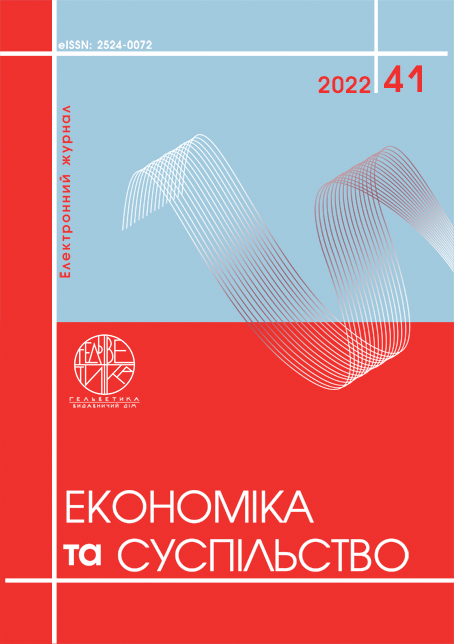THE INFLUENCE OF "DIRTY" MONEY ON THE AKTIVITY OF BEHAVIORAL FINANCE SUBJECTS ON THE FINANCIAL SERVICES MARKET IN UKRAINE
Abstract
The article reveals the peculiarities of the influence of "dirty" money on the actions of behavioral finance subjects in the context of the reconstruction of the Ukrainian economy. At the same time, the experience of democratic countries in limiting the use of similar funds with the help of structures and instruments of the financial services market is taken into account. The tasks of the article are to find out the methods of laundering "dirty" money by certain entities of the financial market; the influence of illegal income on the behavior of individual behavioral finance subjects on the stock market in the conditions of reconstruction of the Ukrainian economy; taking into account the experience of democratic countries in limiting the use of "dirty" funds with the help of financial market structures and instruments. Illegally obtained income (or "dirty" funds) creates significant advantages for their owners when investing in stock market instruments, undermines the foundations of competition in this market. Therefore, when researching behavioral finance for countries with developing markets, it is important to pay special attention to this problem. The end of the "hot" phase of Russia's war against Ukraine and the beginning of the reconstruction of the Ukrainian economy with the help of international investments puts the order of the financial market of our country on the agenda so that it does not turn into a "laundry" for "dirty" money for some foreign and Ukrainian investors. In addition, these funds can worsen the conditions of fair competition for decent subjects of behavioral finance on the Ukrainian stock market. Therefore, it is already important to determine the means of prevention against the use of laundered "dirty" money during the reconstruction period in Ukraine. For this, it is important to use the experience of the leading countries of the world and international organizations on this issue. In addition, it is necessary at the state and local level to put obstacles to attract dirty investments to rebuild the economy of Ukraine on the principles of sustainable development.
References
Свириденко Ю. Яку економіку ми будуємо. URL: https://www.epravda.com.ua/columns/2022/07/8/735131/ (дата звернення: 24.07.2022)
Шаманська Н., Шаманська О. Теорія поведінкових фінансів: генезис та еволюція. Світ фінансів. 2015. № 1. С. 173–184.
Кізима Т. Поведінкові фінанси у концепціях класичної та інституціональної теорій. Світ фінансів. 2013. № 3. С. 7–18.
Талер Р. Поведінкова економіка. Чому люди діють ірраціонально і як отримати з цього вигоду. 3-тє вид. Київ : Наш формат, 2022. 464 с.
Буряк А. В., Діденко І. В. Споживачі на ринку фінансових послуг: огляд поведінкових ефектів та світові підходи до їх врахування. Вісник СумДУ. Серія «Економіка». 2017. № 1. С. 18–26.
Набатова О. О. Від гіпотези ефективних ринків до поведінкових фінансів. Економічна теорія і право. 2018. № 3. С. 36–48.
Малишенко К. А. Поведінкові фінанси та їх вплив на динаміку фондового ринку. Інвестиції: практика та досвід. 2014. № 16. С. 57–64.
Кушнір М. A, Ліпич Л. Г., Сторонянська І. З. Поведінкове ціноутворення на фондовому ринку : монографія. Луцьк : Вежа-Друк, 2017. 200 с.
Кізима Т. О. Фінанси домогосподарств: Сучасна парадигма та домінанти розвитку : монографія. Київ : Знання, 2010. 431 с.
Ушакова Н., Кулініч О., Помінова І. Інституціоналізація поведінкового регулювання: зарубіжний досвід. Бізнес-інформ. 2020. № 9. С. 37–40.
Віхров М. Стратегія здорового глузду. Український тиждень. 2021. № 32. С. 34.
Пікетті Т. Капітал у ХХI столітті. Київ : Наш формат, 2016. 696 с.
Карлін М. І. Фінанси зарубіжних країн : навч. посіб. Київ : Кондор, 2021. 364 с.
Svyrydenko Y. Yaku ekonomiku my buduiemo [What kind of economy are we building]. Available at: https://www.epravda.com.ua/columns/2022/07/8/735131/ (accessed July 24, 2022).
Shamanska N., Shamanska O. (2015) Teoriia povedinkovykh finansiv: henezys ta evoliutsiia [Theory of behavioral finance: genesis and evolution]. Svit finansiv, vol. 1, pp. 173–184.
Kizyma T. (2013) Povedinkovi finansy u kontseptsiiakh klasychnoi ta instytutsionalnoi teorii [Behavioral finance in the concepts of classical and institutional theories]. Svit finansiv, vol. 3, pp. 7–18.
Taler R. (2022) Povedinkova ekonomika. Chomu liudy diiut irratsionalno i yak otrymaty z tsoho vyhodu [Behavioral economics. Why people act irrationally and how to benefit from it]. 3-tie vyd. Kyiv: Nash format. (in Ukrainian)
Buriak A. V., Didenko I. V. (2017) Spozhyvachi na rynku finansovykh posluh: ohliad povedinkovykh efektiv ta svitovi pidkhody do yikh vrakhuvannia [Consumers in the financial services market: a review of behavioral effects and global approaches to their consideration]. Visnyk SumDU. Seriia «Ekonomika», vol. 1, pp. 18–26.
Nabatova O. O. (2018) Vid hipotezy efektyvnykh rynkiv do povedinkovykh finansiv [From the efficient markets hypothesis to behavioral finance]. Ekonomichna teoriia i pravo, vol. 3, pp. 36–48.
Malyshenko K. A. (2019) Povedinkovi finansy ta yikh vplyv na dynamiku fondovoho rynku [Behavioral finance and its influence on the dynamics of the stock market]. Investytsii: praktyka ta dosvid, vol. 16, pp. 57–64.
Kushnir M. A, Lipych L. H., Storonianska I. Z. (2017) Povedinkove tsinoutvorennia na fondovomu rynku: monohrafiia [Behavioral pricing in the stock market: monograph]. Lutsk: Vezha-Druk. (in Ukrainian)
Kizyma T. O. (2010) Finansy domohospodarstv: Suchasna paradyhma ta dominanty rozvytku: monohrafiia [Household Finances: Modern Paradigm and Dominants of Development: monograph]. Kyiv: Znannia. (in Ukrainian)
Ushakova N., Kulinich O., Pominova I. (2020) Instytutsionalizatsiia povedinkovoho rehuliuvannia: zarubizhnyi dosvid [Institutionalization of behavioral regulation: foreign experience]. Biznes-inform, vol. 9, pp. 37–40.
Vikhrov M. (2021) Stratehiia zdorovoho hluzdu [Common sense strategy]. Ukrainskyi tyzhden, vol. 32, p. 34.
Piketti T. (2016). Kapital u ХХI stolitti [Capital in the 21st century]. Kyiv: Nash format. (in Ukrainian)
Karlin M. I. (2021) Finansy zarubizhnykh krain: navch. posib. [Finances of foreign countries: education. manual]. Kyiv: Kondor. (in Ukrainian)


